广汉中学高2006级10月份月考英语试题[上学期]
文档属性
| 名称 | 广汉中学高2006级10月份月考英语试题[上学期] | 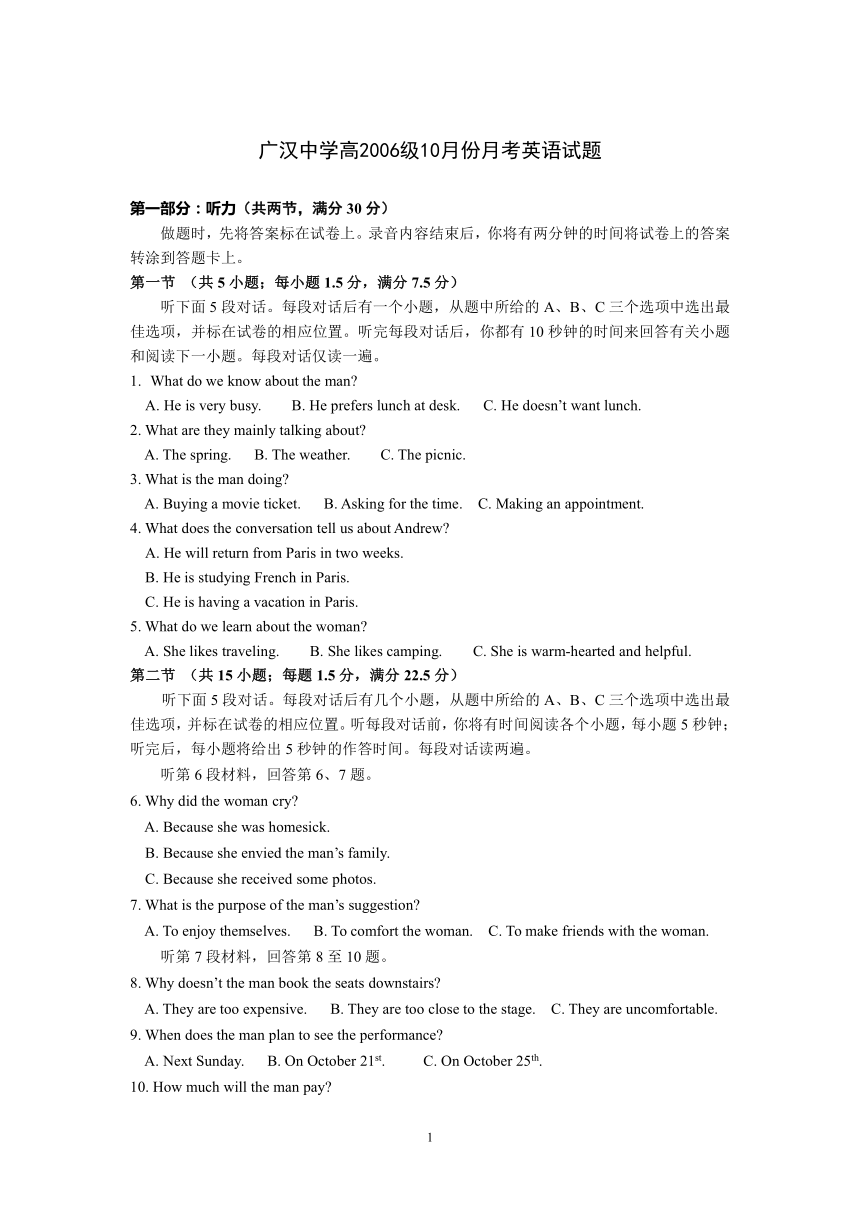 | |
| 格式 | rar | ||
| 文件大小 | 27.1KB | ||
| 资源类型 | 教案 | ||
| 版本资源 | 通用版 | ||
| 科目 | 英语 | ||
| 更新时间 | 2006-08-24 18:19:00 | ||
图片预览

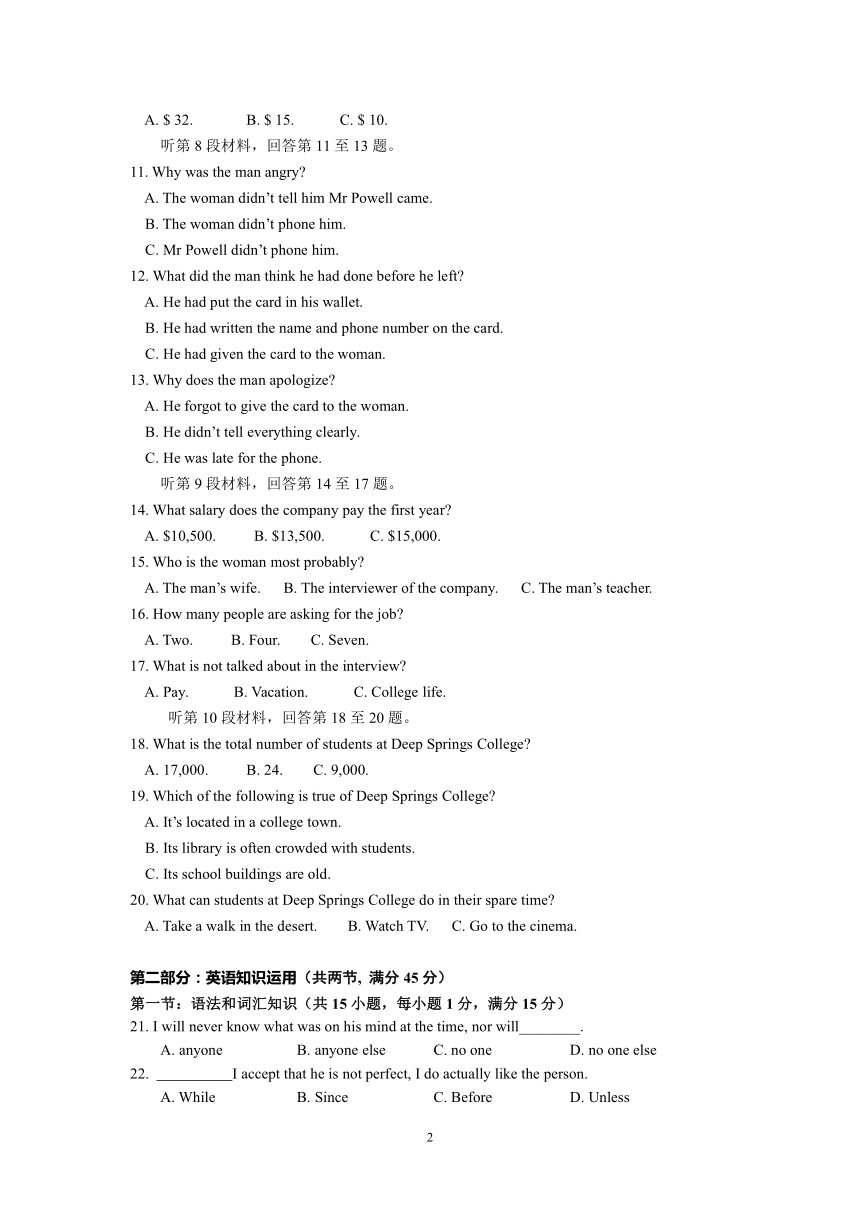
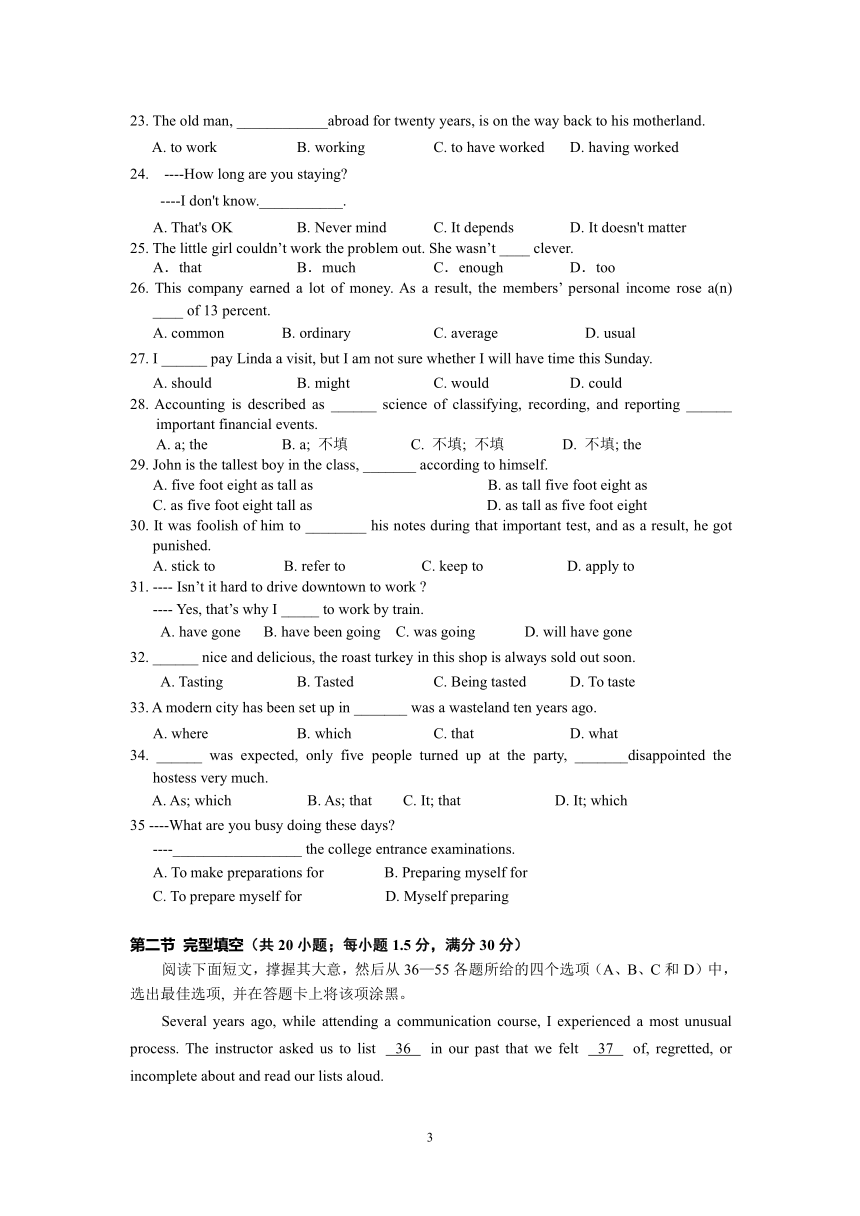
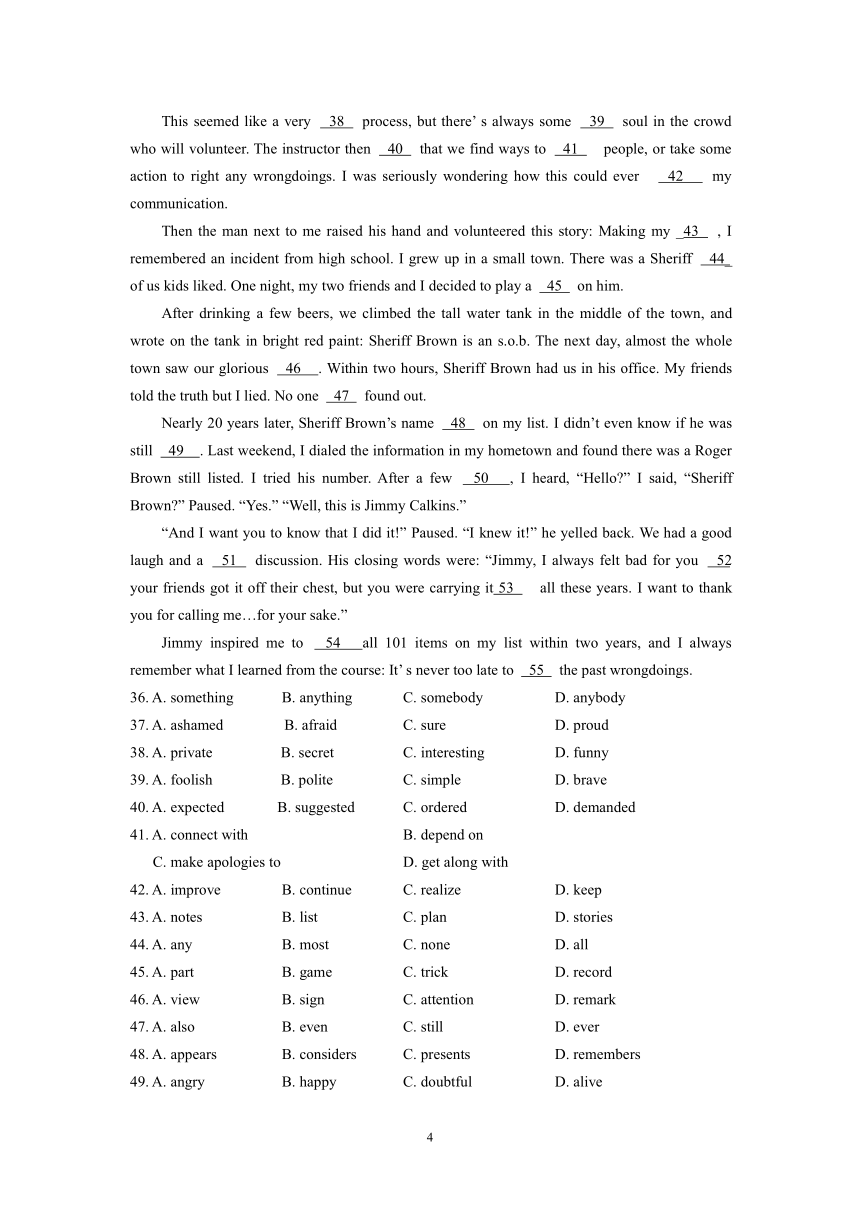
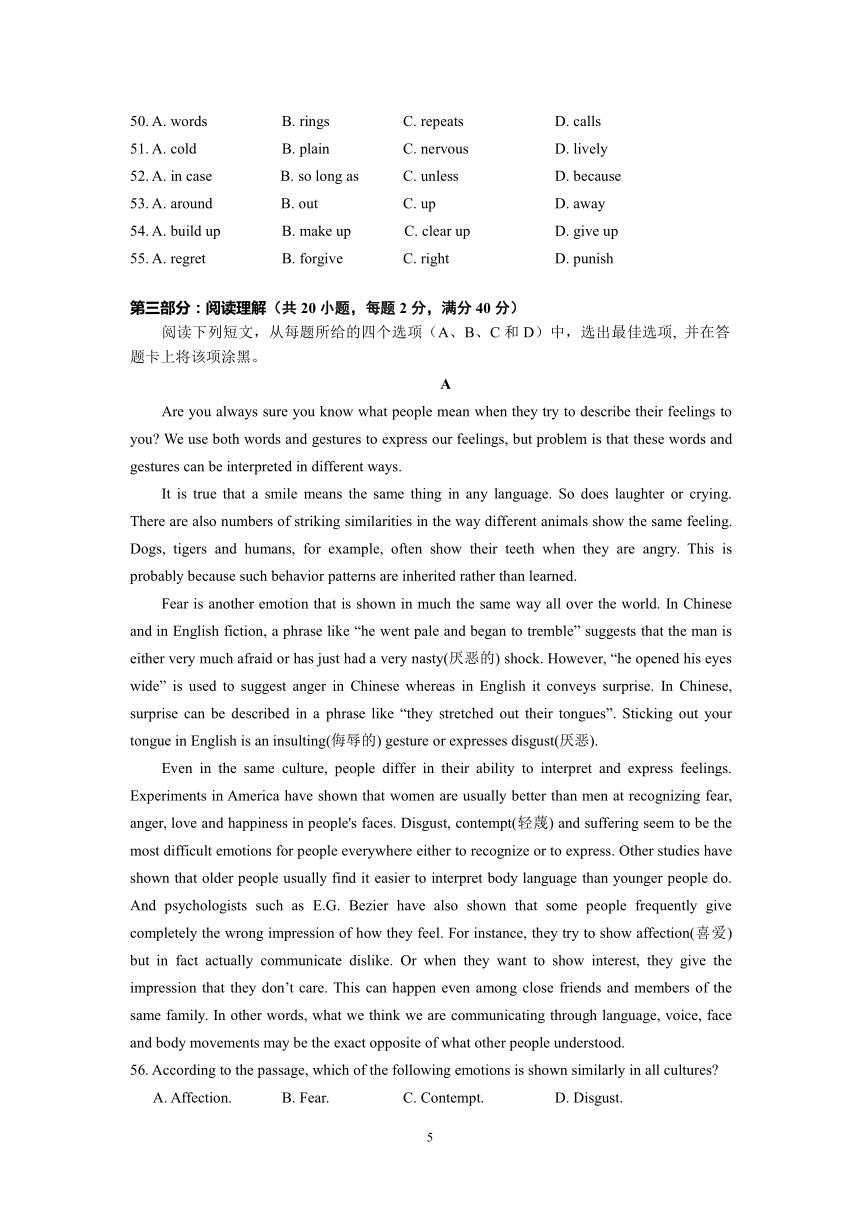
文档简介
广汉中学高2006级10月份月考英语试题
第一部分:听力(共两节,满分30分)
做题时,先将答案标在试卷上。录音内容结束后,你将有两分钟的时间将试卷上的答案转涂到答题卡上。
第一节 (共5小题;每小题1.5分,满分7.5分)
听下面5段对话。每段对话后有一个小题,从题中所给的A、B、C三个选项中选出最佳选项,并标在试卷的相应位置。听完每段对话后,你都有10秒钟的时间来回答有关小题和阅读下一小题。每段对话仅读一遍。
What do we know about the man?
A. He is very busy. B. He prefers lunch at desk. C. He doesn’t want lunch.
2. What are they mainly talking about?
A. The spring. B. The weather. C. The picnic.
3. What is the man doing?
A. Buying a movie ticket. B. Asking for the time. C. Making an appointment.
4. What does the conversation tell us about Andrew?
A. He will return from Paris in two weeks.
B. He is studying French in Paris.
C. He is having a vacation in Paris.
5. What do we learn about the woman?
A. She likes traveling. B. She likes camping. C. She is warm-hearted and helpful.
第二节 (共15小题;每题1.5分,满分22.5分)
听下面5段对话。每段对话后有几个小题,从题中所给的A、B、C三个选项中选出最佳选项,并标在试卷的相应位置。听每段对话前,你将有时间阅读各个小题,每小题5秒钟;听完后,每小题将给出5秒钟的作答时间。每段对话读两遍。
听第6段材料,回答第6、7题。
6. Why did the woman cry?
A. Because she was homesick.
B. Because she envied the man’s family.
C. Because she received some photos.
7. What is the purpose of the man’s suggestion?
A. To enjoy themselves. B. To comfort the woman. C. To make friends with the woman.
听第7段材料,回答第8至10题。
8. Why doesn’t the man book the seats downstairs?
A. They are too expensive. B. They are too close to the stage. C. They are uncomfortable.
9. When does the man plan to see the performance?
A. Next Sunday. B. On October 21st. C. On October 25th.
10. How much will the man pay?
A. $ 32. B. $ 15. C. $ 10.
听第8段材料,回答第11至13题。
11. Why was the man angry?
A. The woman didn’t tell him Mr Powell came.
B. The woman didn’t phone him.
C. Mr Powell didn’t phone him.
12. What did the man think he had done before he left?
A. He had put the card in his wallet.
B. He had written the name and phone number on the card.
C. He had given the card to the woman.
13. Why does the man apologize?
A. He forgot to give the card to the woman.
B. He didn’t tell everything clearly.
C. He was late for the phone.
听第9段材料,回答第14至17题。
14. What salary does the company pay the first year?
A. $10,500. B. $13,500. C. $15,000.
15. Who is the woman most probably?
A. The man’s wife. B. The interviewer of the company. C. The man’s teacher.
16. How many people are asking for the job?
A. Two. B. Four. C. Seven.
17. What is not talked about in the interview?
A. Pay. B. Vacation. C. College life.
听第10段材料,回答第18至20题。
18. What is the total number of students at Deep Springs College?
A. 17,000. B. 24. C. 9,000.
19. Which of the following is true of Deep Springs College?
A. It’s located in a college town.
B. Its library is often crowded with students.
C. Its school buildings are old.
20. What can students at Deep Springs College do in their spare time?
A. Take a walk in the desert. B. Watch TV. C. Go to the cinema.
第二部分:英语知识运用(共两节, 满分45分)
第一节:语法和词汇知识(共15小题,每小题1分,满分15分)
21. I will never know what was on his mind at the time, nor will________.
A. anyone B. anyone else C. no one D. no one else
22. I accept that he is not perfect, I do actually like the person.
A. While B. Since C. Before D. Unless
23. The old man, ____________abroad for twenty years, is on the way back to his motherland.
A. to work B. working C. to have worked D. having worked
24. ----How long are you staying?
----I don't know.___________.
A. That's OK B. Never mind C. It depends D. It doesn't matter
25. The little girl couldn’t work the problem out. She wasn’t ____ clever.
A.that B.much C.enough D.too
26. This company earned a lot of money. As a result, the members’ personal income rose a(n) ____ of 13 percent.
A. common B. ordinary C. average D. usual
27. I ______ pay Linda a visit, but I am not sure whether I will have time this Sunday.
A. should B. might C. would D. could
28. Accounting is described as ______ science of classifying, recording, and reporting ______ important financial events.
A. a; the B. a; 不填 C. 不填; 不填 D. 不填; the
29. John is the tallest boy in the class, _______ according to himself.
A. five foot eight as tall as B. as tall five foot eight as
C. as five foot eight tall as D. as tall as five foot eight
30. It was foolish of him to ________ his notes during that important test, and as a result, he got punished.
?? ??A. stick to?? B. refer to?? C. keep to?? D. apply to
31. ---- Isn’t it hard to drive downtown to work ?
---- Yes, that’s why I _____ to work by train.
A. have gone B. have been going C. was going D. will have gone
32. ______ nice and delicious, the roast turkey in this shop is always sold out soon.
A. Tasting B. Tasted C. Being tasted D. To taste
33. A modern city has been set up in _______ was a wasteland ten years ago.
A. where B. which C. that D. what
34. ______ was expected, only five people turned up at the party, _______disappointed the hostess very much.
A. As; which B. As; that C. It; that D. It; which
35 ----What are you busy doing these days?
----_________________ the college entrance examinations.
A. To make preparations for B. Preparing myself for
C. To prepare myself for D. Myself preparing
第二节 完型填空(共20小题;每小题1.5分,满分30分)
阅读下面短文,撑握其大意,然后从36—55各题所给的四个选项(A、B、C和D)中,选出最佳选项, 并在答题卡上将该项涂黑。
Several years ago, while attending a communication course, I experienced a most unusual process. The instructor asked us to list 36 in our past that we felt 37 of, regretted, or incomplete about and read our lists aloud.?
This seemed like a very 38 process, but there’ s always some 39 soul in the crowd who will volunteer. The instructor then 40 that we find ways to 41 people, or take some action to right any wrongdoings. I was seriously wondering how this could ever 42 my communication.
Then the man next to me raised his hand and volunteered this story: Making my _43 , I remembered an incident from high school. I grew up in a small town. There was a Sheriff 44_ of us kids liked. One night, my two friends and I decided to play a 45 on him.?
After drinking a few beers, we climbed the tall water tank in the middle of the town, and wrote on the tank in bright red paint: Sheriff Brown is an s.o.b. The next day, almost the whole town saw our glorious 46 . Within two hours, Sheriff Brown had us in his office. My friends told the truth but I lied. No one 47 found out.
Nearly 20 years later, Sheriff Brown’s name 48 on my list. I didn’t even know if he was still 49 . Last weekend, I dialed the information in my hometown and found there was a Roger Brown still listed. I tried his number. After a few 50 , I heard, “Hello?” I said, “Sheriff Brown?” Paused. “Yes.” “Well, this is Jimmy Calkins.”
“And I want you to know that I did it!” Paused. “I knew it!” he yelled back. We had a good laugh and a 51 discussion. His closing words were: “Jimmy, I always felt bad for you 52 your friends got it off their chest, but you were carrying it 53 all these years. I want to thank you for calling me…for your sake.”
Jimmy inspired me to 54 all 101 items on my list within two years, and I always remember what I learned from the course: It’ s never too late to 55 the past wrongdoings.?
36. A. something B. anything C. somebody D. anybody?
37. A. ashamed B. afraid C. sure D. proud?
38. A. private B. secret C. interesting D. funny?
39. A. foolish B. polite C. simple D. brave?
40. A. expected B. suggested C. ordered D. demanded
41. A. connect with B. depend on
C. make apologies to D. get along with?
42. A. improve B. continue C. realize D. keep?
43. A. notes B. list C. plan D. stories?
44. A. any B. most C. none D. all?
45. A. part B. game C. trick D. record?
46. A. view B. sign C. attention D. remark?
47. A. also B. even C. still D. ever?
48. A. appears B. considers C. presents D. remembers?
49. A. angry B. happy C. doubtful D. alive?
50. A. words B. rings C. repeats D. calls?
51. A. cold B. plain C. nervous D. lively?
52. A. in case B. so long as C. unless D. because?
53. A. around B. out C. up D. away?
54. A. build up B. make up C. clear up D. give up?
55. A. regret B. forgive C. right D. punish?
第三部分:阅读理解(共20小题,每题2分,满分40分)
阅读下列短文,从每题所给的四个选项(A、B、C和D)中,选出最佳选项, 并在答题卡上将该项涂黑。
A
Are you always sure you know what people mean when they try to describe their feelings to you? We use both words and gestures to express our feelings, but problem is that these words and gestures can be interpreted in different ways.
It is true that a smile means the same thing in any language. So does laughter or crying. There are also numbers of striking similarities in the way different animals show the same feeling. Dogs, tigers and humans, for example, often show their teeth when they are angry. This is probably because such behavior patterns are inherited rather than learned.
Fear is another emotion that is shown in much the same way all over the world. In Chinese and in English fiction, a phrase like “he went pale and began to tremble” suggests that the man is either very much afraid or has just had a very nasty(厌恶的) shock. However, “he opened his eyes wide” is used to suggest anger in Chinese whereas in English it conveys surprise. In Chinese, surprise can be described in a phrase like “they stretched out their tongues”. Sticking out your tongue in English is an insulting(侮辱的) gesture or expresses disgust(厌恶).
Even in the same culture, people differ in their ability to interpret and express feelings. Experiments in America have shown that women are usually better than men at recognizing fear, anger, love and happiness in people's faces. Disgust, contempt(轻蔑) and suffering seem to be the most difficult emotions for people everywhere either to recognize or to express. Other studies have shown that older people usually find it easier to interpret body language than younger people do. And psychologists such as E.G. Bezier have also shown that some people frequently give completely the wrong impression of how they feel. For instance, they try to show affection(喜爱) but in fact actually communicate dislike. Or when they want to show interest, they give the impression that they don’t care. This can happen even among close friends and members of the same family. In other words, what we think we are communicating through language, voice, face and body movements may be the exact opposite of what other people understood.
56. According to the passage, which of the following emotions is shown similarly in all cultures?
A. Affection. B. Fear. C. Contempt. D. Disgust.
57. People sometimes misunderstand each other because _____.
A. their words and gestures may be interpreted in different ways
B. there are no similarities in the way they share the same feeling
C. their behavior patterns are not learned but inherited
D. they have different languages, cultures and emotions
58. People sometimes express the opposite of the emotions they are trying to communicate, which may happen among _____.
A. people of different cultures B. people of the same culture
C. close friends and family members D. all of the above
59. Which of the following statement is NOT true?
A. People in the same culture express their feelings in the same way.
B. People sometimes give completely the wrong impression of how they feel.
C. Women are better than men at recognizing certain emotions.
D. Older people usually understand body language better than younger people.
B
I made a pledge(誓言) to myself on the way down to the vacation beach cottage. For two weeks I would try to be a loving husband and father. Totally loving. No ifs, ands or buts.
The idea had come to me as I listened to a talk on my car radio. The speaker was quoting a Biblical(圣经的)passage about husbands being thoughtful of their wives. Then he went on to say, “Love is an act of will. A person can choose to love.” To myself, I had to admit that I had been a selfish husband. Well, for two weeks that would change.
And it did. Right from the moment I kissed Evelyn at the door and said, “That new yellow sweater looks great on you.”
“Oh, Tom, you noticed,” she said, surprised and pleased. Maybe a little puzzled.
After the long drive, I wanted to sit and read. Evelyn suggested a walk on the beach. I started to refuse, but then I thought, “Evelyn's been alone here with the kids all week and now she wants to be alone with me.” We walked on the beach while the children flew their kites.
So it went. Two weeks of not calling the Wall Street firm where I am a director; a visit to the shell museum though I usually hate museums. Relaxed and happy, that’s how the whole vacation passed. I made a new pledge to keep on remembering to choose love.
There was one thing that went wrong with my experiment, however. Evelyn and I still laugh about it today. On the last night at our cottage, preparing for bed, Evelyn stared at me with the saddest expression.
“What's the matter?” I asked her.
“Tom,” she said in a voice filled with distress(悲痛), “do you know something I don’t?”
“What do you mean?”
“Well…that checkup(体检) I had several weeks ago…our doctor…did he tell you something about me?Tom, you’ve been so good to me…am I dying?”
It took a moment for it all to sink in. Then I burst out laughing.
“No, honey,” I said, wrapping her in my arms. “You’re not dying; I’m just starting to live.”
60. From the story we may infer that Tom drove to the beach cottage ________.
A. with his family B. with Evelyn C. alone D. with his children
61. During the two weeks on the beach, Tom showed more love to his wife because _________.
A. she looked lovely in her new clothes
B. he had made a lot of money in his Wall Street firm
C. he was determined to be a good husband
D. she was seriously ill
62. The author says, “There was one thing that went wrong with my experiment.” What was the one thing that went wrong?
A. He praised her sweater, which puzzled her.
B. She insisted on visiting a museum, which he hated.
C. He knew something about her illness but didn’t tell her.
D. He was so good to her that she thought she must be dying.
63. By saying “I'm just starting to live,” Tom means that ________.
A. he is just beginning to understand the real meaning of life
B. he is just beginning to enjoy life as a loving husband
C. he lived an unhappy life before and is now starting to change
D. he is beginning to feel regret for what he did to his wife before
C
Talking to Teachers—Teachers are just people. Behind that desk, is a living, breathing human being. And just like any human being, they will probably be friendly to people who talk nicely to them. Teachers also seem to get along better with children who take schoolwork seriously and are prepared for class. And, just like any other human being, teachers like to be appreciated. The next time your teacher helps you solve a math problem or figure out a science project, say thank you with a smile.
Talking to Parents—Parents can be very supportive if their children ask for help. If you think there’s something your parents can do to help you socialize more or feel more comfortable around people, then ask them. Very often, parents want very much to help, but really don’t know what to do. Pick a quiet time of the day and ask to talk. Tell them how you feel. Maybe they had the same trouble when they were kids.
This Stranger Thing—This is always a tough one. How do you deal with a neighbor, the mail carrier, or someone walking down your street—situations that often seem to cause arguments between kids and parents. The answer to these questions will vary from kid to kid, from parent to parent because all cultures are different. Some folks live in small towns where a hello to everyone is “what’s done”. Then there are kids who live in the city who may have been taught not to speak to anyone they don’t know. If you’re having trouble with this and always feel awkward in these kinds of situations, you might want to talk to your parents or a teacher about it. Where do they think you should draw the line? When is silence rude and when is it wise?
64. From the first paragraph we may learn that teachers dislike____ .
A. being talked to nicely
B. their students to be serious with the schoolwork
C. the students’ appreciation
D. the students who are not ready for classes
65. If your parents are not supportive and you are not getting along quite well with your parents, who or what is to blame?
A. Your parents. B. Yourself.
C. Lack of communication. D. Your teachers.
66. The underlined word in the third paragraph is close in meaning to____.
A. afraid B. puzzled C. strange D. familiar
67. The passage doesn’t say but it implies that in daily communication____.
A. arguments often happen between kids and parents
B. we should talk to the neighbors and other people according to different cultures
C. city people and country people greet in the same way
D. we should fit our words with proper situations
D
If you have been joining in chat room conversations, or trading email with web pals (网友) , you have become one of the millions who write in a peculiarly short form of English.
And you’ve got a sense of humor about short forms like SOHF (= sense of humor failure) to describe Internet newcomers who don’t understand you.
Across the globe, every night teenagers and their elders are “talking online”, many of them all talking at the same time.
It’s fast: try talking to six people at once. It’s brief: three or four words per exchange. It takes wit, concentration, and quick fingers.
And it requires tremendous linguistic economy (语言省略). There’s neither time nor space for explanations. Why consume precious key-strokes (键盘敲击) telling six friends you have to leave for a moment to take care of your little brother when BRB( = be right back) will do?
Want to enter a conversation? Just type PMFJI (= pardon me for jumping in).
Interested in whom you are talking to? Type A/S/L, the nearly universal request to know your pal’s age, sex and location. You may get 15/M/NY as a response from your pal.
If something makes you laugh, say you are OTF (= on the floor), or LOL (= laughing out loud), or combing the two into ROTFL ( = rolling on the floor laughing) .
And when it is time to get back to work or go to bed, you type GTG (= got to go) or TTYL (=talk to you later).
People want to write as fast as possible, and they want to get their ideas across as quickly as they can. Capital letters are left in the dust, except when expressing emotion, as it takes, more time to hold down the “shift” key and capitals. Punctuation (标点) is going, too.
68. Many people talk on the Internet ______.
A. by sending short emails
B. by using a particular short form of English
C. by using peculiar English words and expression
D. in a funny way
69. In order to talk to several people at the same time on the Internet ______.
A. you have to speak fast and fluently
B. you should speak with wit and humor
C. you have to express your ideas in a brief way
D. one should pay much attention to the accuracy of words
70. If you get 17/F/NY as an answer to your A/S/L, it means______.
A. the person on the other end is 17 from New York and he is fine
B. you are talking to a girl who is 17 and lives in New York
C. you are talking to 17 girls who are from New York
D. the person who you are talking to is a 17-foot tall New York girl
71. To save time on the Internet, __________.
A. some people leave their letters in the dustbin
B. some people never use “shift” in their writing
C. many people leave the capital and punctuation
D. people seldom use capital letters or punctuation
E
Being considered a leader in our society is indeed of high praise. Leadership means power, command respect and, most important, encourages achievement. Unlike vitamin C, leadership skills can’t be easily swallowed down. They must be carefully cultivated.
Different from popular belief, most good leaders are made, not born. They learn their skills in their everyday lives. But which do they develop? How do they (and how can you) get others to follow?
Always give credit. Many leaders note that the most efficient way to get a good performance from others is to treat them like heroes. Giving public credit to someone who has earned it is the best leadership technique in the world. It is also an act of generosity(慷慨) that’s never forgotten.
Giving credit is more effective than even the most constructive criticism(批评), which often hurts rather than helps. Kenneth Blanchard, the author of The One-Minute Manager, agrees, “Catch people doing something right!” he says. Then tell everyone about it.
Take informed risks. “The best leaders know that taking a risk is not a thoughtless exercise,” says management adviser Marilyn Machlowitz. “Sky divers don’t go up in an airplane without checking the parachutes(降落伞) beforehand.” Because the idea of risk also carries with it the possibility of failure, many of us usually wait for others to take charge. But if you want to be a leader, you must learn to fail—and not die a thousand deaths. Pick yourself up and start all over again.
Encourage enthusiasm(热情). “When people understand the importance of work, they lend their mental strengths.” says Lee Ducat. But when they get excited about the work, all their energy gets poured into the job. That’s a great force! Is this the best way to create excitement? Be enthusiastic yourself—You will be followed by everyone.
72. The underlined word“cultivated”( paragraph 1) roughly means .
A. encouraged B. compared C. examined D. developed
73. The part Always give credit tells us that a leader should .
A. give helpful criticism
B. regard others as real heroes
C. praise people for their good performances
D. praise everyone
74. To be a good leader, you should .
A. not be afraid of any risks
B. think twice before taking risks
C. try to avoid any possible failures
D. know what thoughtless exercise is
75. Which of the following can be the best title for the passage?
A. Leadership Is of Skills and Techniques
B. Leadership Is Very Important
C. Not Many Can Be Leaders
D. How to Be a Leader
第四部分:写作(共2节,满分35分)
第一节 短文改错(共10 小题;每小题 1分, 满分10分)
此题要求改正所给短文中的错误。对标有题号的每一行做出判断:如无错误, 在该行右边横线上画一个钩(√);如有错误(每行只有一个错误), 则按下列情况改正:
此行多一个词:把多余的词用斜线()划掉, 在该行右边横线上写出该词,并也用斜线划掉。
此行缺一个词:在缺词处加一个漏字符号(∧),在该行右边横线上写出该加的词。
此行错一个词:在错的词下划一横线,在该行右边横线上写出改正后的词。
注意: 原行没有错的不要改。
Today I attended a meeting holding by our school 76.____
At the meeting more than thirty students praised 77.____
For our happiness, Bruce, monitor of our class, 78.____
who was among them . We all felt proud of him. 79.____
Then the headmaster gave them a talk. He wanted 80.____
us to learn these model students and hoped that 81.____
more and more students will be praised at the 82.____
next school meeting. I was great encouraged and 83.____
made up my mind to work harder. Next week 84.____
there will have an English exam. I’ll try to get good marks. 85.____
第二节: 书面表达(满分25分)
假如你是李华,请就本校食堂服务(canteen service)的状况给校长写一封信。内容包括:
优点
不足
建议
食堂干净
价格偏高
尽快解决(solve)问题
饭菜可口
种类偏少
服务态度好
等候时间较长
词数:100左右;开头和结尾已为你写好。
Dear Mr. Principal.
I am a senior student of our school. I’d like to say something about the canteen service in our school. ________________________________________________________________________
____________________________________________________________________________________________________________________________________________________________________________________________________________________________________________________________________________________________________________________________
_____________________________________________________________________________________________________________________________________________________________________________________________________________________________________________
Thanks for your consideration.
Sincerely yours,
Li Hua
广汉中学高2006级10月份月考英语试题参考答案
1—5ABCBC 6—10ABABC 11—15BCAAB 16—20CCBCA
21—25BADCA 26—30CABDB 31—35BADAB
36—40BAADB? 41—45CABCC 46—50BDADB 51—55DDACC
56—59BADA 60—63CCDB 64—67DCBD 68—71BCBD 72—75DCBD
76.holding→ held 77.praised前加were 78.For→ To 79.去掉who 80.them→ us
81.learn后加from 82 will→ would 83.great→ greatly 84.√ 85. have→ be
One possible version:
Dear Mr. Principal,
I am a senior student of our school. I'd like to say something about the canteen service in our school. In general, the service is satisfactory. The hall is clean and tidy. The dishes look inviting and taste delicious as well. What’s more, the workers there treat us as their friends, which makes us feel very happy.
However, we feel the price of the meals is a little too high. Besides, we can only have a limited variety of dishes with little change every week. In addition, we often have to stand in line for a long time before we can get the meal. You could understand how precious time is to us students. Therefore, may I suggest something be done to solve the problems so that we can all enjoy our meals at school?
Thanks for your consideration.
Sincerely yours,
Li Hua
